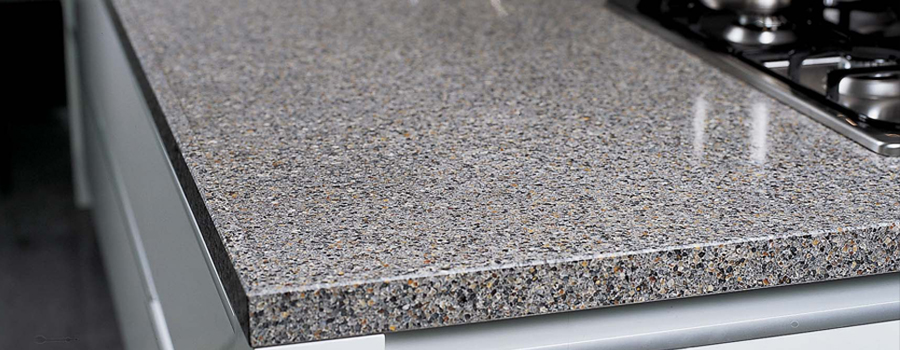Maintenance
Care and maintenance of natural stone benchtops – marble and granite

Generally, prevention will save a great deal of time and money spent on cures and remedies, especially since damage to stone is often irreparable. Polished stone should receive the same care and consideration that is given to a fine wood finish.
- Cleaning natural stone benchtops. Regular cleaning involves only washing with clean tap water and neutral (pH-7) cleaners. “Soap-less” cleaners are preferred because they minimize sticking and filming. However, mild phosphate-free, biodegradable dishwashing liquid, soap flakes or powders which contain no aromatics are acceptable if rinsing is thorough.First wet the stone surface with clean, hot (not boiling) water. Then, using the cleaner solution, wash in small overlapping sweeps. Rinse thoroughly with clean tap water to remove all traces of soap or cleaner solution. Change the water in the rinse pail frequently. Dry with a soft cloth or cotton-flannel and allow to thoroughly air-dry. Chamois skin may be used instead of cotton cloth.
- Stain prevention
 . Coasters and placemats should be used to prevent staining for all drinking glasses and dishes, including water glasses, as marble is susceptible to stains including water rings. To reduce staining, avoid leaving spillage on marble for any period of time. Items such as coffee, red wine, cooking oils, butter, lemon juice, tomatoes and anything else acidic should be wiped off the bench top as soon as possible. Take care to use the proper cleaning agents – ammonia-based products can etch the surface and dull the shine.On installation, natural stone is sealed with a penetrating sealer to help prevent the absorption of stains into the stone. It is recommended that natural stone benchtops be resealed periodically (every 3-6 months) with a penetrating stone sealer.
. Coasters and placemats should be used to prevent staining for all drinking glasses and dishes, including water glasses, as marble is susceptible to stains including water rings. To reduce staining, avoid leaving spillage on marble for any period of time. Items such as coffee, red wine, cooking oils, butter, lemon juice, tomatoes and anything else acidic should be wiped off the bench top as soon as possible. Take care to use the proper cleaning agents – ammonia-based products can etch the surface and dull the shine.On installation, natural stone is sealed with a penetrating sealer to help prevent the absorption of stains into the stone. It is recommended that natural stone benchtops be resealed periodically (every 3-6 months) with a penetrating stone sealer.For removing stains from your stone benchtop, do not use chemical products such as Jif, window cleaner or other acid-based cleaners, as this can cause a scum build up, eventually taking away the high gloss finish of granite and marble. If in doubt there are various cleaning and maintenance products specially designed for cleaning natural stone.
- Protection against heat. Marble has the potential to scorch and, although granite is heat resistant up to between 150 and 200 degrees Celsius, if direct heat is applied regularly, over time hairline cracks may appear reducing the strength of the product. Therefore, it is always advisable to use trivets, potholders and placemats to protect stone surfaces against heat.
- Protection against scratching. While cutting directly on granite surfaces will not affect the large majority of granites the use of a cutting board is recommended. The repeated use of a knife in the same place on a granite bench top will eventually wear down the polish and blunt your knives.
- Protection against weight. Although natural stone is a solid and strong material it will not expand or contract to any measurable degree. Therefore, it should not be subjected to excessive weight or stress or be used as a workbench. Kneeling, sitting or standing on your stone benchtop can cause the surface to fracture or crack. Be particularly careful of the weak part of kitchen benchtops, for example the front and rear of the sink and cook top. Downward pressure to these areas can cause cracking or breakage.

 . Coasters and placemats should be used to prevent staining for all drinking glasses and dishes, including water glasses, as marble is susceptible to stains including water rings. To reduce staining, avoid leaving spillage on marble for any period of time. Items such as coffee, red wine, cooking oils, butter, lemon juice, tomatoes and anything else acidic should be wiped off the bench top as soon as possible. Take care to use the proper cleaning agents – ammonia-based products can etch the surface and dull the shine.On installation, natural stone is sealed with a penetrating sealer to help prevent the absorption of stains into the stone. It is recommended that natural stone benchtops be resealed periodically (every 3-6 months) with a penetrating stone sealer.
. Coasters and placemats should be used to prevent staining for all drinking glasses and dishes, including water glasses, as marble is susceptible to stains including water rings. To reduce staining, avoid leaving spillage on marble for any period of time. Items such as coffee, red wine, cooking oils, butter, lemon juice, tomatoes and anything else acidic should be wiped off the bench top as soon as possible. Take care to use the proper cleaning agents – ammonia-based products can etch the surface and dull the shine.On installation, natural stone is sealed with a penetrating sealer to help prevent the absorption of stains into the stone. It is recommended that natural stone benchtops be resealed periodically (every 3-6 months) with a penetrating stone sealer.